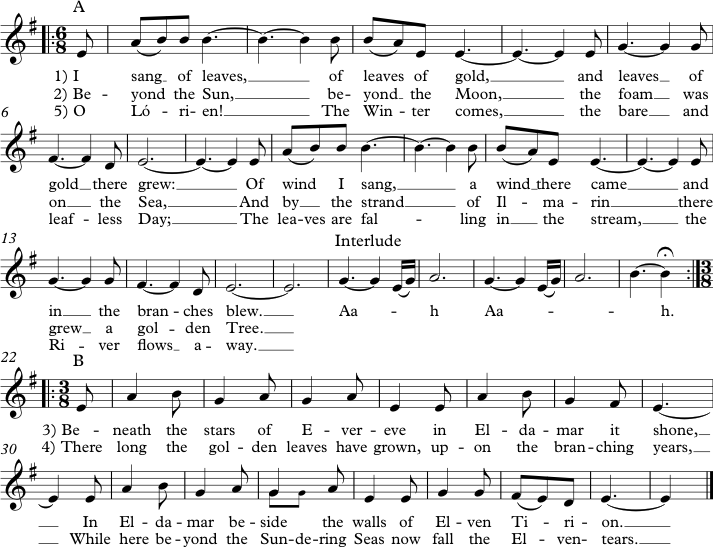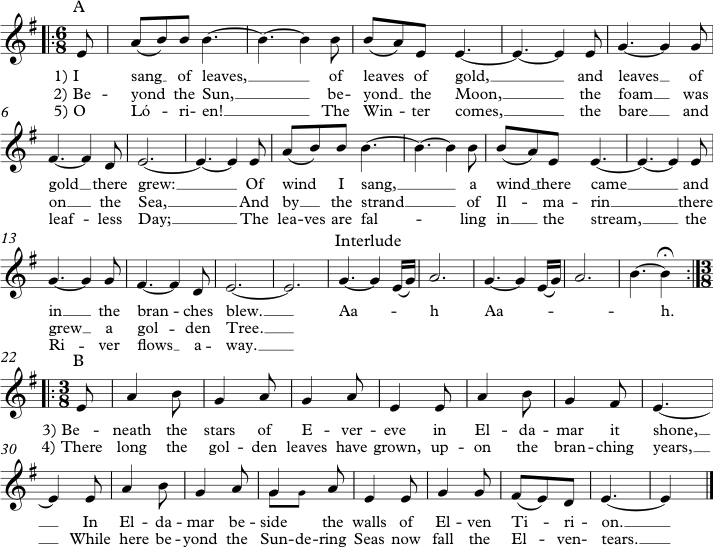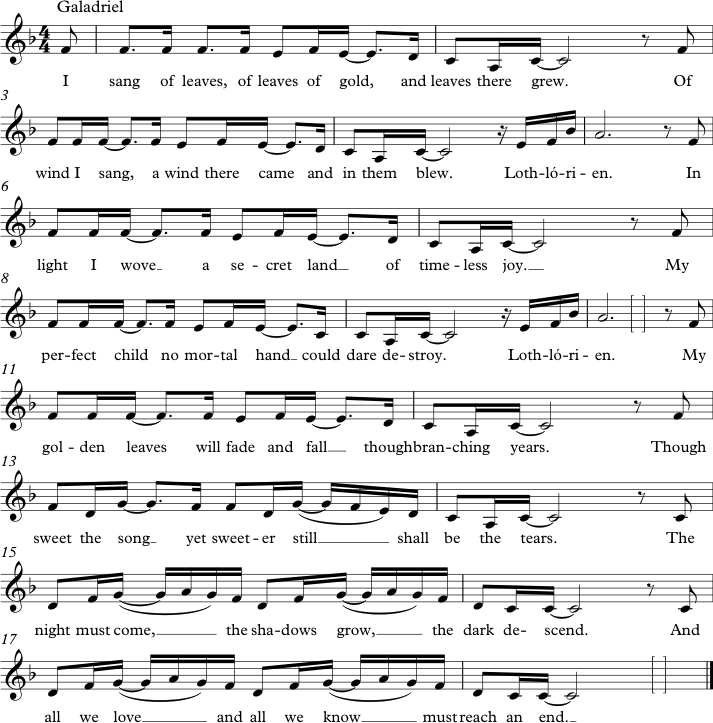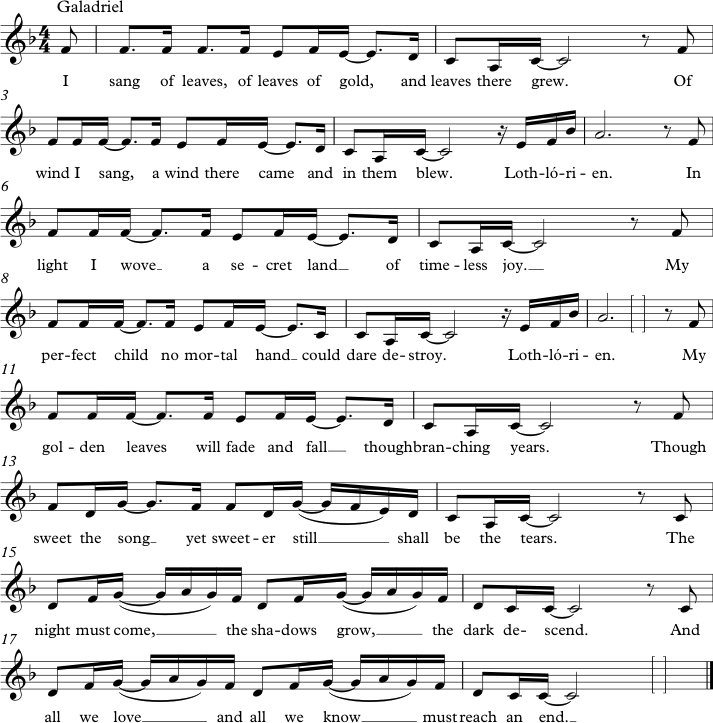Tolkien Ensemble, Galadriel’s Song of Eldamar (I), TE CD 2, Track 12, 6:25.
The Lord of the Rings Musical, Wonder, LotR M, Track 15, 4:56.
The Lord of the Rings Musical, Wonder, LotR M, Track 15, 4:56.
One of the many songs of Elvish origin, the Song of Eldamar is sung by Galadriel on her boat when the Fellowship leaves her realm. Galadriel stands on her boat and holds a harp in her hands. While it is nowhere stated that she played the harp, it is likely that she did – why else should she choose to carry it around with her? She sings a song before inviting the Fellowship to a farewell meal on the water.
I sang of leaves, of leaves of gold, and leaves of gold there grew:
Of wind I sang, a wind there came and in the branches blew.
Beyond the Sun, beyond the Moon, the foam was on the Sea,
And by the strand of Ilmarin there grew a golden Tree.
Beneath the stars of Ever-eve in Eldamar it shone,
In Eldamar beside the walls of Elven Tirion.
There long the golden leaves have grown upon the branching years,
While here beyond the Sundering Seas now fall the Elven-tears.
O Lórien! The Winter comes, the bare and leafless Day;
The leaves are falling in the stream, the River flows away.
O Lórien! Too long I have dwelt upon this Hither Shore
And in a fading crown have twined the golden elanor.
But if of ships I now should sing, what ship would come to me,
What ship would bear me ever back across so wide a Sea?
(LotR, 372).
The Tolkien Ensemble has set the song to music as Galadriel’s Song of Eldamar (I), the piece being a good example of the Ensemble’s perception of Elvish music. The harp mentioned in the text is present in the song and Galadriel’s voice certainly sounds “sad and cool” (LotR, 372). The Ensemble wrote a sad, reminiscent melody, accompanied by plucked harp and string pads, evoking the movement of the water and the steady rustling of the trees of Lothlórien. Incorporating the harp as mentioned by Tolkien was part of creating the realism of the performance, as Reiff notes:
If a specific instrument is mentioned by Tolkien to "be a part of the actual performance in the book" we use it in our interpretation (like Galadriel and harp).
Reiff, e-mail 1
The song is built from single verses, each comprising of two lines. The first five of these are set to music in the form of AABBA. The melody of the A verses is introduced by a solo violin at the beginning of the piece: The first three bars are played twice, then the violin plays rhythmically similar phrases.
transcription (lines 1-10): Galadriel’s Song of Eldamar, TE CD 2, Track 12.
http://soundcloud.com/middle-earth-music/4-1-11-galadriels-song-of/s-jULAu
After Galadriel’s verses (beginning at 0:45) as shown above in the excerpt follows a long interlude, with her singing textless long arches (3:24). The song closes with the last two verses in AA form.
The only textual change from the book is the insertion of an “aah”-bridge between the sentences. Thinking back to the highly skilful origins of music in Middle-earth in the First Music, we can see the use of the A/B model as a remnant of this high musical culture. The theory of reverse development supports this: The Song of Eldamar supposedly is an old song, so it makes sense that it is more oriented towards the former, higher form of music than for example Bilbo’s walking song(s), which are of recent origin and not so much rooted in the traditional culture of such an ancient race as the Elves.
The song is gets some importance in the book as a foreshadowing of Galadriel’s voyage into the West at the end of The Return of the King. There she indeed finds a ship to bear her “back across so wide a Sea”. The song not only foreshadows this event, but also makes it clear that she, like presumably most of her kind, has a deep longing to go to the West and see the Blessed Realm. The song therefore underscores the notation of the passing of the Elves (see 4.2.4 for a song dealing with this subject matter), a process that has long since started when the events of the book take place. After the three Elven Rings, one of which (Nenya) Galadriel was a keeper, have lost their power after the fall of Sauron, their bearers (Elrond, Galadriel and Gandalf) return with them to the West. Apart from Galadriel’s personal wish to see the Blessed Realm again, her song also points to the influence of music in Middle-earth, originating in its creation through the First Music – it is no coincidence that Galadriel chose to sing this particular song, knowing perfectly well that none of her listeners at the time knew about either its content or its significance (maybe with the exception of Aragorn, who may have had an idea of what she was singing about). Nevertheless, she sang this song to them, a clear example of music being intricately weaved into everything that happens in Middle-earth. Contrary to Namárië (see 4.1.1), she sang in Westron, so the characters were able to understand the words.
Galadriel’s song is the only poem from the book of which significant portions were used in the stage show in their original wording. After Sam calls for the aid of Galadriel in Shelob’s lair, she appears and with her light scares Shelob off. It is likely that she helped Sam by singing a spell from afar, because she is not physically present on the occasion. She then sings the song Wonder, clearly in Lothlórien, whose beginning is based on the Song of Eldamar, using some lines from the poem and adding new ones. Words taken from the Song of Eldamar are printed bold:
I sang of leaves, of leaves of gold, and leaves there grew
Of wind I sang, a wind there came and in them blew
Lothlorien
In light I wove a secret land of timeless joy
My perfect child no mortal hand could dare destroy
Lothlorien
[. . .]
My golden leaves will fade and fall through branching years
Though sweet the song yet sweeter still shall be the tears
The night must come, the shadows grow, the dark descend
And all we love and all we know must reach an end
[. . .]
(LotR M, Track 15).
In both the book and the musical, Galadriel sings of creating the world around her (“I sang of leaves and leaves there grew”), but while in the book she speaks of the Blessed Realm, the stage show suggests that she sings about the creation of Lothlórien. This may be due to the fact that the Fading of the Elves in the stage show is not as fleshed out as in the book: Galadriel in both leaves Middle-earth, but there is no detailed explanation where exactly she goes to and that she originated from there. Book and musical both lament the end of the Elven kingdoms, but the song from the musical pushes the sorrow for the end of the influence of the Elves in the background in favour of interpreting the passing of the Elves as a part of the new world after the defeat of Sauron.
The way in which the stage show approaches the music is similar to the Tolkien Ensemble: Both songs share an inherent sadness, but it is notable that Wonder is in a major key, contrary to the E minor of the Song of Eldamar. Wonder begins with a harp, too, again suggesting that Galadriel sings the song in Lothlórien. We do not have a highly melodic introduction as in the case of the Song of Eldamar, but instead the harp plays arpeggiated chords, backed by the string ensemble. Here is Galadriel’s part, conforming to the lyrics extract given above.
transcription (excerpt): Wonder, LotR M, Track 15.
The song then continues, leading into the part also used in The Final Battle (see 4.1.10):
Though worlds will die and worlds will grow
Out of death, life, Out of night, day, glory from sorrow
Out of grief, joy, Out of storm, comes strength for tomorrow
Out of dust, gold. Out of fire, air, comfort forsaken
Out of rage, calm, Out of loss, find, glory awaken
Shine forever, Beacon of light
Blaze in the air, vanquishing night
Sing forever, proud and strong
Anthem of life, conquering song
Though tides of fate, onward run
The song of hope, once begun,
Will evermore Remain.
(LotR M, Track 15).
Wonder stresses the positive aspects of the narrative: While everything seems very dark and grim, with Sauron on the move, seemingly unstoppable, there still is hope. The “song of hope” mentioned here not only refers to the actual Song of Hope, one of the musical numbers in the stage show, but can also be seen in a wider context: The literal song of hope, the music central to the whole physical world will continue to sound as long as Eä exists. As Ilúvatar has hinted to during the performance of the First Music, everything that happens (even Melkor’s most gruesome deeds) is in its essence rooted in His thought and therefore part of His plan. So from a grand perspective, hope always remains. This overall plan is what is likely referred to by the “tides of fate”. The stage show, by including these allusions to the First Music, both stresses the general importance of music in Middle-earth as well as the significance of the actions taken by the protagonists not only for their immediate timeframe, but also in the grand scheme of the ages. The end of the War of the Ring marks the end of the Third Age and the beginning of the Fourth Age (the Age of Men). Galadriel’s songs (both in the book and the stage show) confirm the Passing of the Elves and ultimately their passing as the logical and inevitable outcome of this process: While it is sad that the time of the Elves has ended, it is inevitable and something the Elves knew was coming for a long time.




